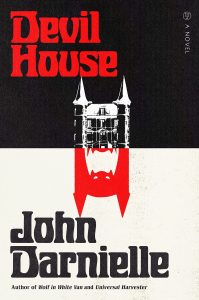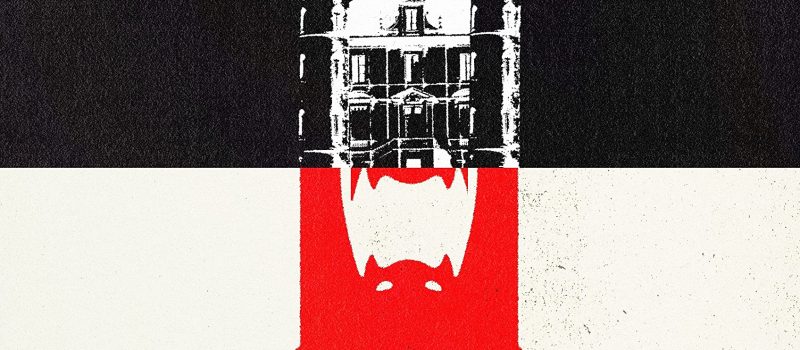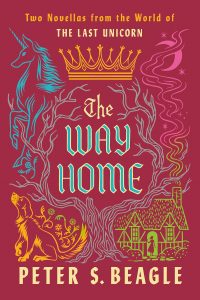Ian Mond Reviews Devil House by John Darnielle
 Devil House, John Darnielle (MCD 978-0-37471-767-4, $27.00, 416pp, hc) January 2022.
Devil House, John Darnielle (MCD 978-0-37471-767-4, $27.00, 416pp, hc) January 2022.
Over the last several years, John Darnielle, the founding (and oftentimes sole) member of the band The Mountain Goats, has been carving out a career as an acclaimed novelist. His 2014 debut, Wolf in White Van, was nominated for the National Book Award, while his sophomore effort, Universal Harvester, is a brilliant, unclassifiable story that exists in the liminal space between multiple genres. His latest book, Devil House, also doesn’t conform to a recognisable shape. What begins as a conventional story about an author’s research into a 20-year-old murder mystery becomes a breathtaking, metafictional interrogation of the ‘‘truth’’ in true crime.
At the suggestion of his editor, true-crime writer Gage Chandler heads to Milpitas in California to research and write about the murder of a landlord and property developer at the alleged hands of disgruntled teenagers during the Satanic panic of the mid-’80s.
The few choice bits were tantalizing enough – dead bodies atop a pyre of pornography, cryptograms in graffiti, the spectre of teenage Satanic rites jolting a sleepy old town awake.
The conceit for Chandler’s novel (again suggested by his editor) is that he purchase and live in the property where the double murder occurred – a once adult bookstore now known as the ‘‘Devil House.’’ It’s a terrific set-up, especially when we discover that despite all the talk of Satan-loving teenagers, the murderer was never apprehended. And yet, just as we’re getting drawn into the checkered history of Chandler’s new home, the novel switches focus and we’re presented with a lengthy excerpt from Chandler’s debut true crime novel, The White Witch – his only book to be adapted into a film. Here we’re told the story of teacher Diana Crane, who murders two of her students after they break into her apartment. What would generally be a clear-cut case of self-defence, considering one of the young men hit Crane with a vase, is complicated by the fact that she not only stabbed her assailants multiple times but then sliced up their corpses, only to be caught attempting to dump the severed body parts into the ocean. Later the media dubs Diana the ‘‘White Witch’’ because of the copies of Everyday Witchcraft found in her apartment.
We expect that the two crimes, both with occult overtones, will somehow be connected, that in researching the ‘‘Devil House,’’ Chandler will uncover a secret that shines a light on the ‘‘White Witch’’ murders. But that’s not the game Darnielle is playing. Instead, Devil House questions the ethics of true crime novels by asking whether any story, no matter how well researched, or closely it cleaves to the facts, can ever claim to be ‘‘true.’’ Darnielle signposts his intent with the book’s paradoxical premise – a fictional true-crime writer investigates a fictional true crime – and by the opening pages, where we learn that Chandler’s love for storytelling is informed by his family’s belief they are descended from royalty – a ‘‘fact’’ he’s never been able to confirm. The novel’s unconventional structure – the way Darnielle switches between Chandler’s obsessive research into the ‘‘Devil House’’ murders (complete with the sourcing of crime photos and rare artefacts related to the crime scene) and lengthy excerpts from the author’s work further reinforces the idea that truth is in the eye of the beholder. But the section of the novel that speaks this the loudest is an emotionally devastating letter written by Jana Perez, the mother of one of the boys Diana Crane murdered. In filling in the background details about her abusive marriage and her son’s troubled childhood, Jana condemns Chandler for not giving her son a voice, for centring his narrative on the misunderstood and maligned school teacher. ‘‘Where was Jesse at all? The same place he was in the movie I let them make: wandering around like a pig waiting to be yelled at and beaten and stabbed in the heart and roasted on a spit, living a worthless life whose only purpose was to be sacrificed for somebody else’s story.’’
Darnielle is not the first writer to recognise that truth is a slippery commodity or opine about the morality of true-crime novels (and podcasts and documentaries). As with his previous books, it’s Darnielle’s eclectic approach to his subject matter, his unwillingness to conform to a specific style or mode, that makes his work stand out and feel fresh. I know it’s only January, but I’m sure Devil House will be one of my best novels of the year.
Ian Mond loves to talk about books. For eight years he co-hosted a book podcast, The Writer and the Critic, with Kirstyn McDermott. Recently he has revived his blog, The Hysterical Hamster, and is again posting mostly vulgar reviews on an eclectic range of literary and genre novels. You can also follow Ian on Twitter (@Mondyboy) or contact him at mondyboy74@gmail.com.
This review and more like it in the January 2022 issue of Locus.
 While you are here, please take a moment to support Locus with a one-time or recurring donation. We rely on reader donations to keep the magazine and site going, and would like to keep the site paywall free, but WE NEED YOUR FINANCIAL SUPPORT to continue quality coverage of the science fiction and fantasy field.
While you are here, please take a moment to support Locus with a one-time or recurring donation. We rely on reader donations to keep the magazine and site going, and would like to keep the site paywall free, but WE NEED YOUR FINANCIAL SUPPORT to continue quality coverage of the science fiction and fantasy field.
©Locus Magazine. Copyrighted material may not be republished without permission of LSFF.





